Climate change made weather that fuelled Portugal and Spain’s deadly wildfires this summer around 40 times more likely, new research has found.
Blazes in the Iberian Peninsula broke out at the end of July. Fuelled by temperatures above 40°C and strong winds, the flames spread extremely rapidly. The area burned by these wildfires has now broken records across Spain and Portugal.
A new super rapid scientific analysis by World Weather Attribution (WWA) has found that these hot, dry and windy conditions were made more likely and more intense by human-caused climate change.
Dr Clair Barnes, researcher for the Centre for Environmental Policy at Imperial College London, warns that the “astonishing” size of these fires is a “sign of what is to come” with hotter, drier, more flammable conditions becoming more severe with climate change.
It is giving rise to fires of “unprecedented intensity”.
“With every fraction of a degree of warming, extreme, long-lasting heatwaves will continue to intensify, increasing the chance of huge wildfires like the ones that burned vast areas of the Iberian Peninsula,” she says.
Climate change made fire-prone conditions more intense
Scientists found climate change intensified the weather that enabled the explosive spread of the fires, including Spain’s hottest consecutive ten days on record.
The hot, dry and windy conditions that fuelled the fires in Spain and Portugal are now around 40 times more frequent and around 30 per cent more intense than they would be in a world without climate change.
Before climate change, similar extreme spells of hot, dry and windy conditions would have been incredibly rare and expected once every 500 years. Today, with 1.3°C of warming, they are expected once every 15 years.
Scientists also looked at the heatwave, finding that in a world without climate change, similar events would be expected less than every 2,500 years. With current warming, they are expected once every 13 years.
The results of the analysis back up a similar study recently released by WWA which found that climate change also intensified weather that fuelled deadly wildfires in Türkiye, Greece and Cyprus.
Europe’s firefighters are under pressure
Experts say the study also highlights the strain on firefighters in Europe. Weather conditions have sparked large, unpredictable wildfires across the south of the continent, stretching the EU’s resources.
“Firefighters are increasingly working in chaotic and unpredictable conditions, tackling fires that behave in ways they’ve never seen before,” says Centre for Environmental Policy researcher, Theodore Keeping.
As fires raged on 13 August, Spain made its first-ever request for international firefighting reinforcements to the European Civil Protection Mechanism. Spain’s Prime Minister Pedro Sanchez said it was likely the largest such request ever facilitated by the EU.
“Climate change is fuelling more extreme wildfires, but adaptation isn’t keeping pace. We need to see a shift in thinking and a greater focus on prevention,” Keeping adds.
The scale of the fires across the Iberian Peninsula has put incredible pressure on resources.
More than 380,000 hectares of land have burned in Spain since the start of 2025 – almost five times the yearly average. In Portugal, more than 260,000 hectares have been lost. That is close to 3 per cent of the country’s land mass and three times the average area burned by wildfires in a year.
The total area lost to wildfires across the two countries so far this year is roughly four times the size of Greater London. Together, fires in Spain and Portugal make up around two-thirds of Europe’s total burned area for 2025, which, in August, passed one million hectares for the first time since records began in 2006, according to the European Forest Fire Information System.
Spain is being ‘hit hard’ by climate change
At least eight people have been killed by the blazes, and tens of thousands have been forced to evacuate. Smoke led to dangerous air quality in Spain and Portugal and has travelled as far as France, the UK and Scandinavia.
Friederike Otto, a climate science Professor at the Centre for Environmental Policy, says Spain is being “hit hard” by climate change.
“These enormous fires follow the devastating floods in Valencia and another summer of relentless heat above 40°C,” she says.
“Extreme weather is becoming more frequent, but deaths and damages are preventable. Every level of government must work together to adapt to climate change. For wildfires, there’s an urgent need to control vegetation in rural areas, particularly land that has been abandoned by farmers and shepherds.”
Public opinion in Spain has focused on the decline of rural activities, resulting in the growth of vegetation that has fuelled fires. Rural depopulation and an ageing population across parts of both Spain and Portugal have left forest land unmanaged. Fewer people and less traditional grazing have seen natural vegetation control sharply decline, leaving a lot of fuel for fires.
But, Professor Otto adds, ultimately, the world needs to stop burning fossil fuels.
“The wildfires in Europe show that 1.3°C of warming today is already incredibly dangerous. Without a faster shift away from fossil fuels, we could hit 3°C this century. Wildfires at this level would be catastrophic.”

